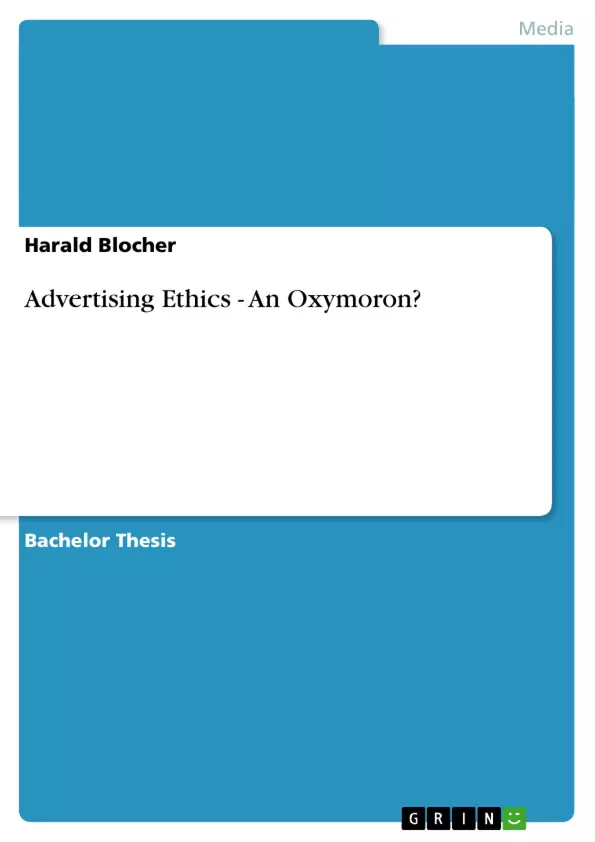Advertising as the most visible element of the marketing-mix is concerning its ethical dimension actually in the midst of controversary. The expression of “advertisng ethics” is nowadays a good example when being asked to name an oxymoron. This project therefore concentrates on ethics applied to the advertising profession.
The ethical dimension of advertising and its impact on consumers in general as well as on children as a target group is the main focus of the study. The aim of the study will be reached through drawing attention to the two major philosophical theories applied to business as well as advertising, utilitarianism and deontology.
In order to gain a fair understanding of the subject, advertising and its role in society are examined. Furthermore, the ethical issues in advertising are presented based on the so-called legal and moral discourse. Since the method of advertising to children actually raises a lot of controversial opinions, this part of the legal discourse is examined in more detail. Due to these controversies, a primary research has been executed, with the aim to collect three controversial opinions of institutions involved in the debate of ethics in advertising. The participants in this debate are industry, advertising agencies and the third point of view of a so-called opinion leader. The study closes with the discussion of research findings with reference to the literature review, followed by the overall conclusion.
Inhaltsverzeichnis (Table of Contents)
- INTRODUCTION
- CHAPTER ONE:
- Basic philosophical principles of business ethics
- 1.1 Introduction
- 1.2 Business Ethics
- 1.3 Utilitarianism
- 1.3.1 Act Utilitarianism
- 1.3.2 Rule Utilitarianism
- 1.4 Deontology
- CHAPTER TWO:
- Ethical issues in advertising
- 2.1 Introduction
- 2.2 Definition and role of advertising
- 2.3 Basic ethical advertising issues
- 2.3.1 The legal aspects
- 2.3.2 The moral aspects
- CHAPTER THREE:
- The impact of advertising on children
- 3.1 Introduction
- 3.2 Advertising to children
- 3.3 Basic ethical principles of advertising to children
- 3.4 Businesses that are advertising to children
- 3.5 Main media channels directed to children
- 3.5.1 Television advertising to children
- 3.5.2 Internet advertising
- 3.5.3 Mobile marketing
- 3.5.4 In-school marketing
- Methodology
- Results
- Conclusion
- References
- Bibliography
Zielsetzung und Themenschwerpunkte (Objectives and Key Themes)
This project aims to analyze the ethical dimension of advertising, particularly focusing on the controversial notion of "advertising ethics" as an oxymoron. The study explores the ethical implications of advertising on consumers in general, with a special emphasis on children as a target group. To achieve this, the project draws upon two prominent philosophical theories of ethics, utilitarianism and deontology, which are applied to both business and the advertising profession.
- Ethical principles of business ethics and their application to advertising
- The role and impact of advertising on consumer behavior and society
- The ethical issues in advertising, particularly regarding legal and moral aspects
- The impact of advertising on children and the ethical considerations involved
- Analysis of controversial opinions on advertising ethics from industry, advertising agencies, and opinion leaders
Zusammenfassung der Kapitel (Chapter Summaries)
Chapter One: Basic philosophical principles of business ethics This chapter introduces the fundamentals of business ethics, exploring the two major ethical theories: utilitarianism and deontology. It examines the relevance of these theories in the context of advertising, highlighting the need for organizations to consider societal moral values when pursuing profits.
Chapter Two: Ethical issues in advertising This chapter delves into the definition and role of advertising in society. It then focuses on the ethical issues surrounding advertising, analyzing both the legal and moral discourses. The legal discourse examines areas like deception, puffery, endorsements, and advertising to children, while the moral discourse explores the distinction between “having a right” and “doing the right thing.”
Chapter Three: The impact of advertising on children This chapter examines the specific ethical issues surrounding advertising to children. It discusses the growing profitability of the child market and explores the ethical principles that should govern advertising targeted at this demographic. The chapter also analyzes the main media channels used for advertising to children, including television, internet, mobile marketing, and in-school marketing.
Schlüsselwörter (Keywords)
This project revolves around the core concepts of business ethics, advertising ethics, and the ethical implications of advertising on children. Key themes include utilitarianism, deontology, consumer behavior, legal and moral discourse, deception, puffery, endorsements, and the impact of advertising on vulnerable groups.
Frequently Asked Questions
Is "advertising ethics" an oxymoron?
The project explores this controversy, examining whether the profession of advertising can truly align with ethical principles while pursuing profit.
What are the main ethical theories applied to advertising?
Utilitarianism (focusing on the greatest good for the greatest number) and Deontology (focusing on duty and moral rules) are the primary frameworks used.
Why is advertising to children particularly controversial?
Children are considered a vulnerable target group. The study examines the legal and moral issues of marketing to them via TV, the internet, and schools.
What is the difference between legal and moral discourse in advertising?
Legal discourse focuses on regulations and deception, while moral discourse explores the ethical responsibility beyond what is simply permitted by law.
What are common ethical issues in modern advertising?
Key issues include puffery (exaggeration), deceptive endorsements, and the impact of mobile and in-school marketing on consumer behavior.
- Citation du texte
- Harald Blocher (Auteur), 2003, Advertising Ethics - An Oxymoron?, Munich, GRIN Verlag, https://www.grin.com/document/93910



